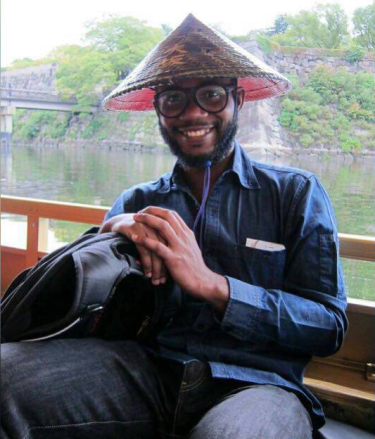 Meet Issa Yusuf. Issa is a native of Nigeria. Growing up with a father who was a miner, young Issa got interested in petrochemical engineering although many from his high school were interested in accounting, law, and medicine. Medicine was an absolute no no since Issa feared the sight of human blood. Issa is very passionate about education, after his undergraduate studies he fulfilled his paramilitary service by teaching Physiology and Anatomy to college students in Nigeria. In 2011, Issa authored his first book, Concurring Educational Challenges, to help struggling students in his native land. Besides being very productive in the lab, Issa helps taking care of his two young children.
Meet Issa Yusuf. Issa is a native of Nigeria. Growing up with a father who was a miner, young Issa got interested in petrochemical engineering although many from his high school were interested in accounting, law, and medicine. Medicine was an absolute no no since Issa feared the sight of human blood. Issa is very passionate about education, after his undergraduate studies he fulfilled his paramilitary service by teaching Physiology and Anatomy to college students in Nigeria. In 2011, Issa authored his first book, Concurring Educational Challenges, to help struggling students in his native land. Besides being very productive in the lab, Issa helps taking care of his two young children.
What set you on this trajectory of becoming a scientist?
After I graduated high school and took my Joint Admission and Matriculation Board exam, which is required in Nigeria to attend college, I majored in physiology. My favorite subjects were neurophysiology and neuroanatomy, together with general physiology. These subjects gave me an in-depth understanding of the different systems in the body and their functions. After my undergraduate studies, I obtained my master’s degree at the University of Ibadan in physiology, majoring in endocrinology and metabolism.
When did you decide to pursue a PhD?
All along, my goal was to get a PhD in neuroscience. Unfortunately, neuroscience was not a popular subject in Nigeria and the university did not have enough resources to build a strong program. It became clear that I would not be able to get a PhD in Neuroscience in Nigeria. I started to attend talks and networked with the visiting speakers and professors. Through these interactions I learned about some summer internship programs through the International Brain Research Organization (IBRO). As a mater student I was fortunate to obtain a couple of these fellowships, which at the time were only obtained by faculty members.
Can you tell us the role immigration has played in your scientific pursuit?
Immigration plays a major role in my scientific career. Through the IBRO fellowships, I was able to study in Uganda, Ethiopia, and Morocco while concurrently finishing my master’s degree. During my travels, I was able to build my network and portfolio while getting international exposures. Through these networking I received a full scholarship to Taiwan for my PhD in Interdisciplinary Neuroscience with a focus on Huntington Disease.
How has this journey shaped you as a citizen of the world and a scientist?
My travels throughout Africa and Asia gave me a broader worldview and gave me a better understanding of people. I learned to adapt and to grow a tough skin. I also learned to appreciate the role resources have on science and education.
Your trajectory to where you are now was not linear, do you have any regrets?
My only regret is not discovering science at a very early age.
Why did you choose your current lab? And what is the focus of your research?
Having worked on Huntington Disease for my PhD, I wanted to continue my research in neurodegerative diseases. When I met with Zuoshang I loved the project that we discussed and his scientific approach to the questions we wanted to go after. Our main goal as a lab is to understand the mechanism of ALS and find possible therapeutic interventions. We use a robust mouse model as well as human samples to gain insights into ALS progression.
What’s your career aspiration after your postdoc?
I would like to stay in academia.
What are some of the lessons you learned along the way that you would like to share with other trainees in the BMP department?
Be patient and listen to your mentor, often time they come from a position of experience.
What role do you think scientists play in solving some of the current issues we face as a society?
We need to be involved and be vocal. We also need to communicate better to demystify science.